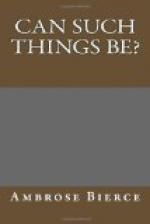Having posted his men, instructed his sergeants and retired to his station, he seated himself on a log, and with senses all alert began his vigil. For greater ease he loosened his sword-belt and taking his heavy revolver from his holster laid it on the log beside him. He felt very comfortable, though he hardly gave the fact a thought, so intently did he listen for any sound from the front which might have a menacing significance—a shout, a shot, or the footfall of one of his sergeants coming to apprise him of something worth knowing. From the vast, invisible ocean of moonlight overhead fell, here and there, a slender, broken stream that seemed to plash against the intercepting branches and trickle to earth, forming small white pools among the clumps of laurel. But these leaks were few and served only to accentuate the blackness of his environment, which his imagination found it easy to people with all manner of unfamiliar shapes, menacing, uncanny, or merely grotesque.
He to whom the portentous conspiracy of night and solitude and silence in the heart of a great forest is not an unknown experience needs not to be told what another world it all is—how even the most commonplace and familiar objects take on another character. The trees group themselves differently; they draw closer together, as if in fear. The very silence has another quality than the silence of the day. And it is full of half-heard whispers—whispers that startle—ghosts of sounds long dead. There are living sounds, too, such as are never heard under other conditions: notes of strange night-birds, the cries of small animals in sudden encounters with stealthy foes or in their dreams, a rustling in the dead leaves—it may be the leap of a wood-rat, it may be the footfall of a panther. What caused the breaking of that twig?—what the low, alarmed twittering in that bushful of birds? There are sounds without a name, forms without substance, translations in space of objects which have not been seen to move, movements wherein nothing is observed to change its place. Ah, children of the sunlight and the gaslight, how little you know of the world in which you live!




